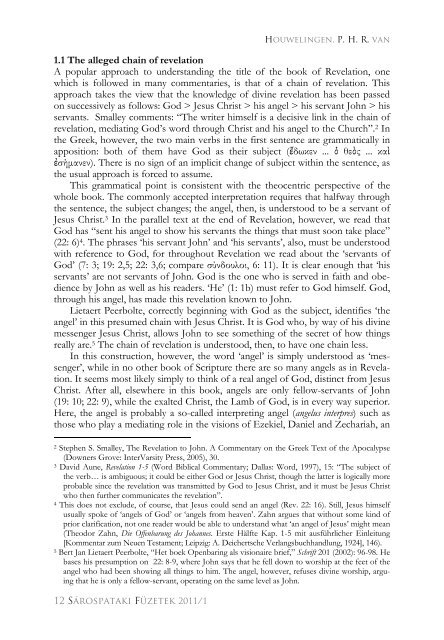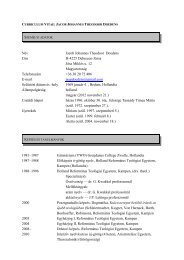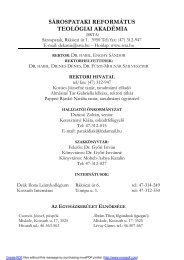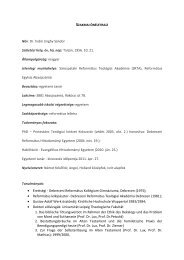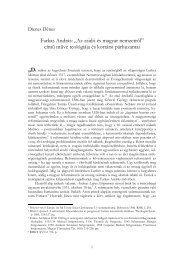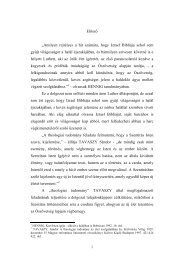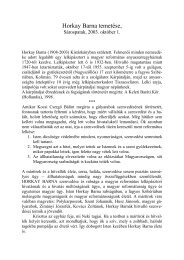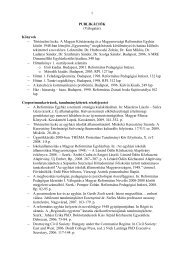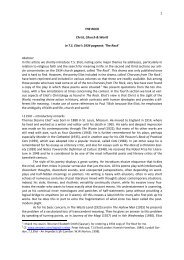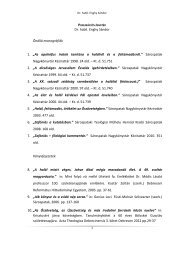2011/1 - Sárospataki Református Teológiai Akadémia
2011/1 - Sárospataki Református Teológiai Akadémia
2011/1 - Sárospataki Református Teológiai Akadémia
- No tags were found...
Create successful ePaper yourself
Turn your PDF publications into a flip-book with our unique Google optimized e-Paper software.
12 Sárospataki Füzetek <strong>2011</strong>/1<br />
Houwelingen, P. H. R. van<br />
1.1 The alleged chain of revelation<br />
A popular approach to understanding the title of the book of Revelation, one<br />
which is followed in many commentaries, is that of a chain of revelation. This<br />
approach takes the view that the knowledge of divine revelation has been passed<br />
on successively as follows: God > Jesus Christ > his angel > his servant John > his<br />
servants. Smalley comments: “The writer himself is a decisive link in the chain of<br />
revelation, mediating God’s word through Christ and his angel to the Church”. 2 In<br />
the Greek, however, the two main verbs in the first sentence are grammatically in<br />
apposition: both of them have God as their subject (ἔδωκεν ... ὁ θεὸς ... καὶ<br />
ἐσήμανεν). There is no sign of an implicit change of subject within the sentence, as<br />
the usual approach is forced to assume.<br />
This grammatical point is consistent with the theocentric perspective of the<br />
whole book. The commonly accepted interpretation requires that halfway through<br />
the sentence, the subject changes; the angel, then, is understood to be a servant of<br />
Jesus Christ. 3 In the parallel text at the end of Revelation, however, we read that<br />
God has “sent his angel to show his servants the things that must soon take place”<br />
(22: 6) 4 . The phrases ‘his servant John’ and ‘his servants’, also, must be understood<br />
with reference to God, for throughout Revelation we read about the ‘servants of<br />
God’ (7: 3; 19: 2,5; 22: 3,6; compare σύνδουλοι, 6: 11). It is clear enough that ‘his<br />
servants’ are not servants of John. God is the one who is served in faith and obedience<br />
by John as well as his readers. ‘He’ (1: 1b) must refer to God himself. God,<br />
through his angel, has made this revelation known to John.<br />
Lietaert Peerbolte, correctly beginning with God as the subject, identifies ‘the<br />
angel’ in this presumed chain with Jesus Christ. It is God who, by way of his divine<br />
messenger Jesus Christ, allows John to see something of the secret of how things<br />
really are. 5 The chain of revelation is understood, then, to have one chain less.<br />
In this construction, however, the word ‘angel’ is simply understood as ‘messenger’,<br />
while in no other book of Scripture there are so many angels as in Revelation.<br />
It seems most likely simply to think of a real angel of God, distinct from Jesus<br />
Christ. After all, elsewhere in this book, angels are only fellow-servants of John<br />
(19: 10; 22: 9), while the exalted Christ, the Lamb of God, is in every way superior.<br />
Here, the angel is probably a so-called interpreting angel (angelus interpres) such as<br />
those who play a mediating role in the visions of Ezekiel, Daniel and Zechariah, an<br />
2 Stephen S. Smalley, The Revelation to John. A Commentary on the Greek Text of the Apocalypse<br />
(Downers Grove: InterVarsity Press, 2005), 30.<br />
3 David Aune, Revelation 1-5 (Word Biblical Commentary; Dallas: Word, 1997), 15: “The subject of<br />
the verb… is ambiguous; it could be either God or Jesus Christ, though the latter is logically more<br />
probable since the revelation was transmitted by God to Jesus Christ, and it must be Jesus Christ<br />
who then further communicates the revelation”.<br />
4 This does not exclude, of course, that Jesus could send an angel (Rev. 22: 16). Still, Jesus himself<br />
usually spoke of ‘angels of God’ or ‘angels from heaven’. Zahn argues that without some kind of<br />
prior clarification, not one reader would be able to understand what ‘an angel of Jesus’ might mean<br />
(Theodor Zahn, Die Offenbarung des Johannes. Erste Hälfte Kap. 1-5 mit ausführlicher Einleitung<br />
[Kommentar zum Neuen Testament; Leipzig: A. Deichertsche Verlangsbuchhandlung, 1924], 146).<br />
5 Bert Jan Lietaert Peerbolte, “Het boek Openbaring als visionaire brief,” Schrift 201 (2002): 96-98. He<br />
bases his presumption on 22: 8-9, where John says that he fell down to worship at the feet of the<br />
angel who had been showing all things to him. The angel, however, refuses divine worship, arguing<br />
that he is only a fellow-servant, operating on the same level as John.


